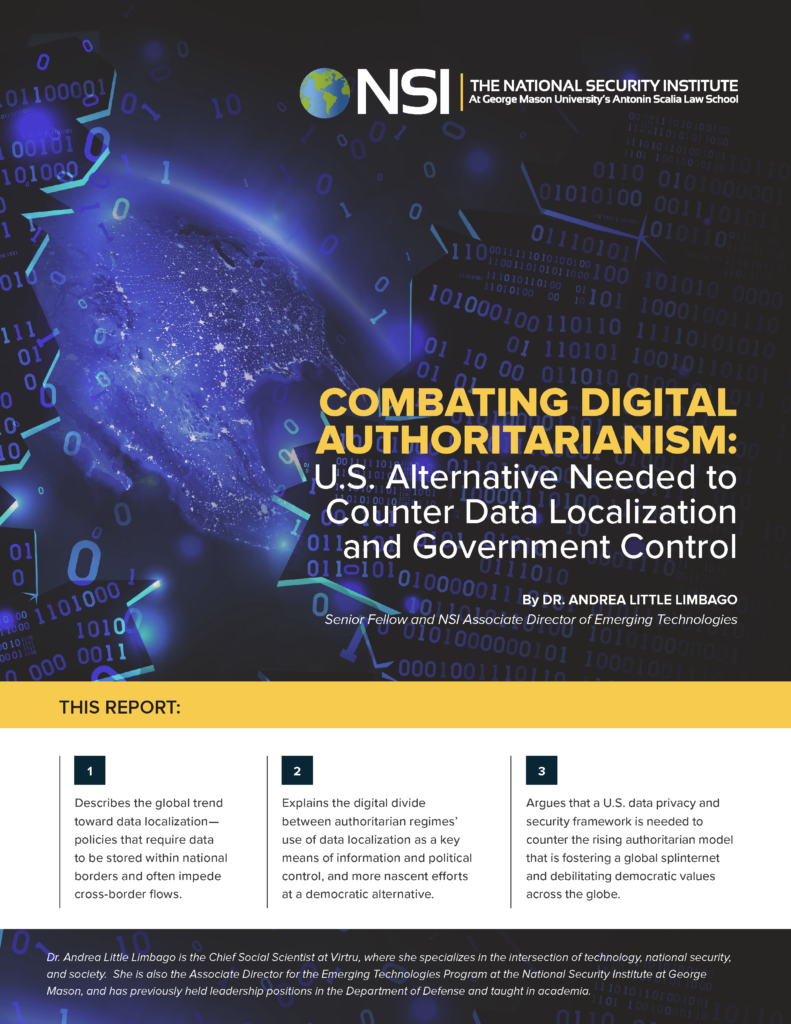May 23, 2019
Contact: Jessica Jones
[email protected]
703-993-8061
“Combating Digital Authoritarianism:
U.S. Alternative Needed to Counter Data Localization and Government Control”

Arlington, VA – On May 23, 2019, the National Security Institute (NSI) at George Mason University’s Antonin Scalia Law School published its latest NSI Report, “Combating Digital Authoritarianism: U.S. Alternative Needed to Counter Data Localization and Government Control,” by NSI Senior Fellow and NSI Associate Director of Emerging Technologies Dr. Andrea Little Limbago.
This NSI Report:
- Describes the global trend toward data localization—policies that require data to be stored within national borders and often impede cross-border flows.
- Explains the digital divide between authoritarian regimes’ use of data localization as a key means of information and political control, and more nascent efforts at a democratic alternative.
- Argues that a U.S. data privacy and security framework is needed to counter the rising authoritarian model that is fostering a global splinternet and debilitating democratic values across the globe.
“Dr. Andrea Little Limbago’s paper on data localization rightly lays out challenges posed by the growing patchwork of data localization and privacy laws around the world and the threat to global freedom posed by authoritarian regimes in this space,” said NSI Founder and Executive Director Jamil N. Jaffer. Mr. Jaffer continued, “The most important point Dr. Limbago’s piece makes, however, is the need for the U.S. to reassert its leadership in this space, and she provides a set of key tenets that should guide U.S. data policy going forward; every policymaker that thinks hard about these questions should keep these key ideas in mind as they move forward.”
The paper is available here.
Dr. Limbago’s bio can be found here.
About the National Security Institute
The National Security Institute serves as a platform for research, teaching, scholarship, and policy development that incorporates a realistic assessment of the threats facing the United States and its allies, as well as an appreciation of the legal and practical challenges facing U.S. intelligence, defense, law enforcement, homeland security, and cybersecurity communities. NSI draws on the experience of its visiting fellows, as well as its highly distinguished advisory board and faculty, to produce timely research and policy materials that deliver insightful analysis and actionable recommendations to senior policymakers in the White House and key departments and agencies, as well as those on Capitol Hill.
About George Mason
George Mason University is Virginia’s largest public research university. Located near Washington, D.C., Mason enrolls more than 33,000 students from 130 countries and all 50 states. Mason has grown rapidly over the past half-century and is recognized for its innovation and entrepreneurship, remarkable diversity, and commitment to accessibility.
About the Scalia Law School
The Antonin Scalia Law School at George Mason University is defined by three words: Learn. Challenge. Lead. Students receive an outstanding legal education (Learn), are taught to critically evaluate prevailing orthodoxy and pursue new ideas (Challenge), and, ultimately, are well prepared to distinguish themselves in their chosen fields (Lead). It has been one of America’s top-ranked law schools for the last fifteen years.
